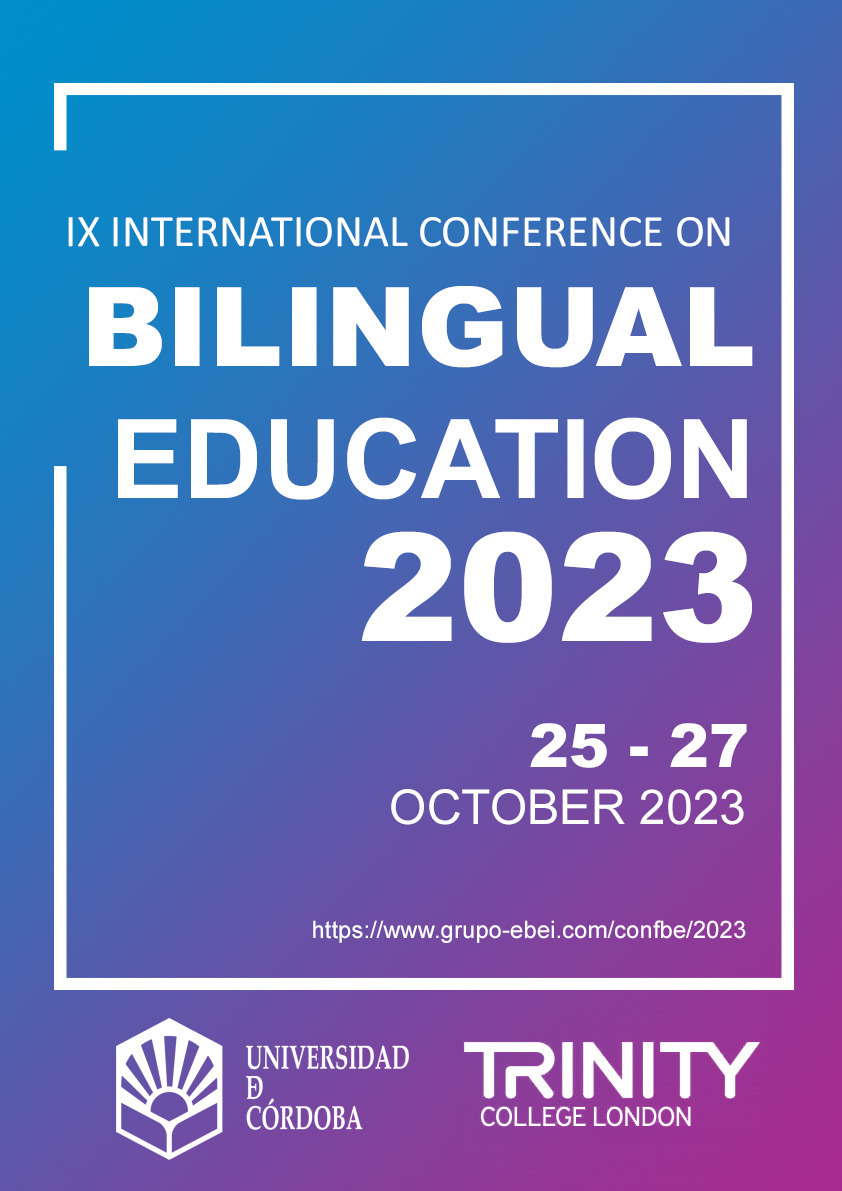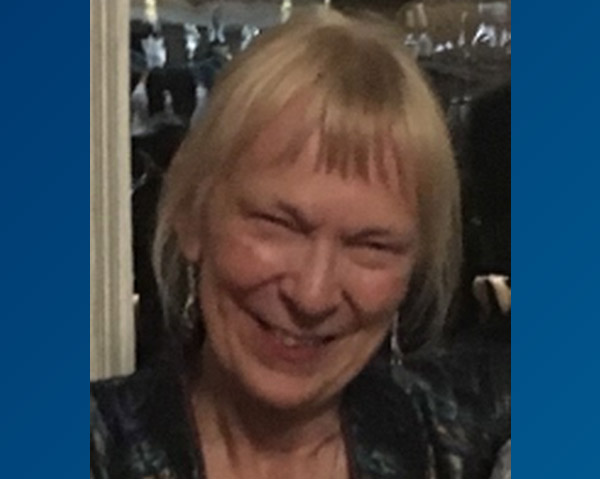Bienvenidos/as
IX Congreso Internacional sobre Educación Bilingüe. Ya estamos de vuelta.
Ofrecemos todos los detalles a continuación.
IX Congreso Internacional sobre Educación Bilingüe. Ya estamos de vuelta.
Ofrecemos todos los detalles a continuación.


Mantenemos la esencia de pasadas ediciones, volviendo a la estructura de participación en directo a través de comunicaciones presenciales, diálogos científicos-formativos, ateneos pedagógicos y talleres formativos. Añadimos la posibilidad de enviar comunicaciones en formato vídeo o texto para quienes no puedan desplazarse a Córdoba en las fechas del Congreso.

La Universidad de Córdoba se honra en volver a organizar y acoger en su Rectorado la octava edición del Congreso Internacional sobre Educación Bilingüe, que ya se ha convertido en una referencia nacional e internacional en el área, y que cuenta con ponentes y participantes de renombrado prestigio y relevancia.
Hoy más que nunca, la celebración de este congreso se convierte en un evento imprescindible para la comunidad científica y educativa internacional. Organizaciones nacionales e internacionales (UNESCO, OCDE, Consejo de Europa, MECD y Junta de Andalucía, entre otras) apuntan hace ya tiempo la importancia crucial de la educación bilingüe para el entendimiento de los pueblos y para el establecimiento de la convivencia. Cada vez más, por tanto, la educación bilingüe se vertebra como un factor crucial en el sistema social, que contribuye positiva y decididamente al avance científico, al desarrollo personal del individuo, y a la mejora de las posibilidades laborales de la población.
Desde la Universidad de Córdoba, junto con el resto de las instituciones colaboradoras y organizadoras, estamos convencidos de que este IX Congreso Internacional sobre Educación Bilingüe se convertirá, un año más, en un espacio compartido y de intercambio de experiencias e investigaciones encaminadas a promover el desarrollo de la educación bilingüe a través de la investigación en la acción, así como de la difusión de sus resultados.
En calidad de Rector de la Universidad de Córdoba me honra apoyar esta iniciativa y animar al Comité Científico y al Comité Organizador de este Congreso para que continúen con esta importante labor. Así, he querido aprovechar este espacio para invitar a participantes, ponentes, colaboradores y asistentes a continuar haciendo de este IX Congreso un lugar de encuentro, de reflexión y de innovación a una manera de educar marcadamente relevante en el panorama internacional, y de absoluta prioridad para quienes, con ahínco y por devoción, nos dedicamos a la formación de los jóvenes en este complejo siglo XXI. Sean, pues, estas palabras, de calurosa bienvenida a los participantes en este IX Congreso Internacional sobre Educación Bilingüe.
La Universidad de Córdoba es vuestra casa; sentíos en ella y hacednos partícipes de las conclusiones a las que llegue este Congreso.
El Comité Organizador del Congreso tiene el honor de confirmar la celebración de diferentes sesiones plenarias a cargo de expertos de renombrado prestigio internacional. Las diferentes sesiones se publicarán en la Plataforma Virtual del Congreso y estarán disponibles para todos los participantes durante los días de celebración del Congreso.

University of Warwick (UK)
Anthony J. Liddicoat is Professor in the Department of Applied Linguistics at the University of Warwick and Adjunct Professor in Justice and Society at the University of South Australia. His research interests include issues relating to the teaching and learning of intercultural capabilities in language education and language policy and planning and he has published widely in each of these areas. He is a Fellow of the UK Academy of Social Sciences and the Executive Editor of Current Issues in Language Planning and co-editor of the book series Language and Intercultural Communication in Education (Multilingual Matters). His recent books include Teaching and learning second language pragmatics for intercultural understanding (2022, Routledge, with Troy McConachy), Introduction to conversation analysis (2021, Bloomsbury), Routledge international handbook of language education policy in Asia (2019, Routledge) Language policy and planning in universities: Teaching, research and administration (2017, Routledge).
Title: Teaching languages from an intercultural perspective
Abstract: Language education has always had as a central goal the development of learners’ abilities to understand and communicate with people from other cultures. However, this aspect of teaching and learning is often under-developed. Language teaching has often been focused on language structures, together with some limited cultural content that is often not closely linked with language and communication. This presentation will argue for the inclusion of an intercultural perspective in language teaching; that is, a view of language teaching that puts the development of intercultural understanding and communication abilities at the heart of language learning. The presentation will examine what adopting an intercultural perspective might be in language education. It will consider the difference between adopting an intercultural perspective and how this differs form a focus on ‘teaching culture’ in the language classroom. It will also consider some of the ways that our understandings of core concepts such as language, culture and learning need to be become richer when teaching from an intercultural perspective and examine some principles and processes for integrating such intercultural perspective in language teaching and learning.

Johannes Gutenberg-University (ALEMANIA)
Oliver Meyer is Professor for English-Didactics at the Johannes Gutenberg-University in Mainz. He is also a qualified teacher of Geography and EFL with several years of CLIL-teaching experience. His research interests include foreign language learning in mono- and multilingual settings as well as the use of educational technologies to design next-generation ecologies for Deeper Learning. Oliver has coordinated the work of the Graz Group and played a leading role in the development of the Pluriliteracies Model for Deeper Learning.
Title: Beyond CLIL: Pluriliteracies teaching for deeper learning
Abstract: Pluriliteracies Teaching for Learning (PTL) constitutes a relatively recent development in Content and Language Integrated Learning (CLIL). This approach has been developed to provide pathways for deeper learning across languages, disciplines and cultures by focusing on the development of disciplinary or subject specific literacies. Deeper learning – by which we understand the successful internalization of conceptual knowledge and the automatization of subject specific procedures/skills and strategies – is currently considered to occur only if learners are taught how to express their knowledge appropriately and in an increasingly complex and subject adequate manner.
In the keynote I would like to introduce the revised Pluriliteracies Model for Deeper Learning and discuss challenges of putting this approach into practice. Also, I will present empirical evidence from two intervention studies which investigated the effects of pluriliteracies-based teaching methods on the depth of learning. In both studies, the experimental groups outperformed the respective control groups (standard CLIL classrooms) in all applied measures of subject literacy (i.e., syntactical complexity, lexical complexity, fluency, conceptual depth) with effect sizes ranging from f=0.38 to f=1.45 indicating that a focus on subject literacy may promote development of academic language and deeper understanding of subject content.
Coyle, D., Meyer, O., Staschen-Diehlmann (2023): A deeper learning companion. Putting Pluriliteracies into Practice. Cambridge University Press.
Coyle, D., Meyer, O. (2021): Beyond CLIL. Pluriliteracies Teaching for Deeper Learning. Cambridge University Press.

University of Edinburgh (UK)
Do is an international expert in the field of CLIL (Content and Language Integrated Learning) as a language teacher (French, Russian and English) in a wide range of schools in the UK and France, and as an academic, working and researching ways of improving pupils’ experiences in classrooms where other languages are used as a means of learning. As an early pioneer of the CLIL, working with bilingual teachers, she developed the CLIL 4Cs framework and the Language Triptych – now adopted and adapted globally to guide and plan pedagogical approaches. Do strives to give teachers and their students confidence in developing conditions for deeper learning and to ensure that learning is spatially designed, inclusive yet cognitively challenging – built on linguistic progression – and interculturally connected. At the University of Aberdeen (2008-2017), as Dean of the Faculty of Education and Music she was a founding member of the Graz Group – a transnational, ECML-funded research team- involved in developing an inclusive PluriLiteracies approach to Teaching for Deeper Learning (PTDL).Throughout her career, Do has focused on “shared learning” and technology-enabled spaces that allow all learners to connect with other sites of learning, from the most local to the most global. Her interests include spatial awareness to emphasise how space (inside, outside and across physical boundaries) influences pupils’ achievement and self-worth. Currently at the University of Edinburgh (2017-) as Professor in Language Education and Classroom Pedagogies – she focuses on inclusive pluriliteracies education and spatial literacies where she directs the Scottish Alliance. Her work is based on a very simple principle: educators, practitioners and learners are experts; it is researchers who must “own” their practices, be digitally connected and collaboratively construct learning spaces to achieve the optimal conditions for deeper learning. Above all, she believes that language is our greatest learning (and teaching) tool.
Title: Listening to teachers: evidence about how classroom practices open up pluriliteracies pathways in CLIL
Abstract: In this session, the spotlight is on how transforming pedagogic principles into classroom realities impacts on young people’s learning in bilingual education/CLIL settings. Building on the PTDL model and what this means for teachers involved in different ages and stages of schooling, actioned manageable participatory classroom enquiry. The outcomes provide evidence of what can be achieved through professional co-operative communities of practice. Working together can create ‘safe’ spaces, where questioning what we do and why is a shared, debated and experimented endeavour. In so doing, the need to unravel wicked questions with learners, foregrounds critical spaces where epistemic and textual fluency become ‘normalised’ in our professional dialogue and task design, so that the roles of languages of, for and through learning across different contexts and subject disciplines become transparent. Indeed, repositioning language learning as a discipline in a national curriculum, alongside other subjects or phenomena open learning trajectories which demand realignment in the here-and-now and through following decades. Enabling this to happen, to grow and to evolve is a fundamental collective responsibility, and, in the words of a participating headteacher – it’s so powerful!

Cambridge University Press
Victoria Peña ha trabajado como profesora dando clase a alumnos de diferentes edades y niveles. Desde que se incorporó a Cambridge, ha colaborado en proyectos de evaluación en distintas regiones y ha ofrecido presentaciones para profesores. Victoria es licenciada en Traducción e Interpretación, tiene un máster en Lingüística Aplicada y un doctorado sobre el efecto de los exámenes de dominio en los estudiantes de idiomas.
Informal assessment in the classroom
Abstract:
This session will look at how the different types of assessment (formative, summative, peer and self-assessment) can contribute to teaching and learning and how to integrate them in the classroom. We will also discuss ideas and tools to adapt our feedback to the different activities and our students’ needs.
The session will begin with an overview of different types of formal and more informal assessment and explore what purposes each can be used for within a classroom situation. The discussion will then focus on the apparent dichotomy between formative and summative assessment, where we will argue that while these are perceived as mutually exclusive, in the long run all forms of assessment are formative in that all forms of assessment can be used in some way to inform future learning.
We will then go on to explore different stages within the course of learning in which informal assessment can be introduced. For each stage we will look at which forms of assessment would be the most appropriate and give some ideas of assessment activities which can be used, both for primary and secondary aged students. The aim here is to show how assessment can be used as part of the learning process before, during and after a particular activity, checking the purpose of the assessment at each point and also showcasing opportunities for peer- and self-assessment alongside more traditional teacher assessment. Activities will also be chosen for different skills and levels of maturity.
One key aspect which we will focus on throughout the session is how to ensure that different forms of assessment are fair and objective. To this end we will look at the use of rubrics and success criteria in the learning process, both as a way of assessing our students at the end of the process and as a way of guiding and informing their learning journey
The final section of the session will focus on perhaps the most informal form of assessment – informal feedback. We will look in particular at what makes feedback effective and how we can build this into our daily classroom routine.

British Council
Aidan Holland is working as Global Assessment Solutions Manager, Wider Europe. He has been working for the British Council in a variety of roles since 2009. He has over 20 years international experience in teaching and teacher training and almost a decade of experience in academic management positions. He holds an MA in TEFL/SL from the University of Birmingham and is currently halfway through a second MA in Language Testing with the University of Lancaster. He is currently based in Spain.
The Future of English: Potential Implications for Bilingualism in Spain
Aidan Holland, British Council Assessment Solutions Manager
In his publication English Next (2006), David Graddol predicted how the position of the English language would evolve in the early part of the 21st Century. Building on Graddol’s work, the British Council’s Future of English programme seeks to identify the current and possible future trends shaping the role of English in today’s world.
In this interactive session, the presenter will direct the audience to those themes felt to be more relevant to educational professionals working in bilingual contexts in Spain. It will also consider what some of the potential implications of those themes might be. By the end of the session, the audience will have gained an overview of key themes and trends driving the use of the English language and had the opportunity to reflect on its relevance to their contexts.
Le facilitamos toda la información acerca del procedimiento de registro y los requisitos para la participación en el Congreso.